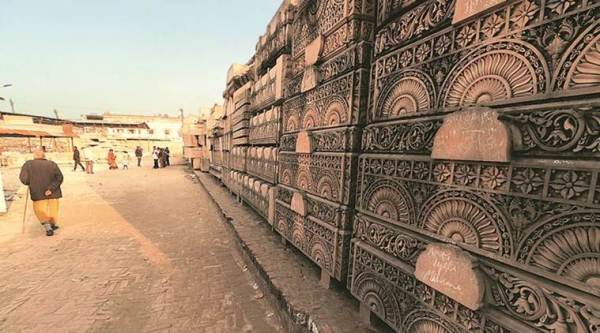
Observing “we have no control over what happened in the past… and so we cannot undo that”, a five-judge Constitution Bench of the Supreme Court Wednesday reserved its order on whether or not to refer the Ayodhya title dispute for mediation. In favour of giving “healing” a chance, the bench said if there was to be mediation, it may ask the parties involved to suggest names of possible mediators.
The bench, comprising Chief Justice of India Ranjan Gogoi and Justices S A Bobde, D Y Chandrachud, Ashok Bhushan and S Abdul Nazeer, is hearing appeals against the September 30, 2010 order of the Allahabad High Court which ordered a three-way division of the disputed 2.77 acres of the Ram Janmabhoomi-Babri Masjid site, giving a third each to the Nirmohi Akhara sect, the Sunni Central Wakf Board, UP, and Ramlalla Virajman.
Explained | Mediation as a way out in Ayodhya – a short history
When the counsel of one of the parties in favour of a Ram temple at the Ayodhya site submitted that it was difficult to forget what invaders had done in the past, Justice Bobde said: “Don’t tell us history. We have also read history… Don’t tell us what we already know. We have no control over what happened in the past… of Babur… and so we cannot undo that. We can only undo what exists in the present moment and that’s the dispute.”
As the proceedings began, advocate Hari Shankar Jain, representing a faction of the Hindu Mahasabha, said the mediation process was bound to fail as there could be no compromise on the place of the birth of Lord Ram. “It’s a question of our faith and sentiments. It’s Ramjanmabhoomi. There is no question of compromise,” he said.
Justice Bobde replied that even in a matrimonial dispute, when a court refers a matter to mediation, it does so with the knowledge that it may result either in reconciliation or divorce.
“You are assuming that there can only be one outcome… Are you not saying it’s going to be failure even before we have ordered it… That is not fair. That is prejudging the outcome,” he said, adding “we are of view that this is not just a dispute about the land. It’s one about sentiments.”
“We are conscious of the dispute, conscious of the body politic of this country. That’s how this idea (whether it should be referred to mediation) came up. We are looking at minds, hearts and healing if possible. That’s the whole idea… We do not know how it can be objected to even before…,” Justice Bobde said. Advocate Jain said that under the law, the suit being of representative nature, it was necessary to issue public notice.
Senior Advocate C S Vaidyanathan, appearing for the deity Ramlalla Virajman, too sought to make the point that mediation efforts would not bear fruit. “These are matters of faith and non-justiciable. That it is the Ramjanmabhoomi cannot be subject to any compromise… What can best be done is to give alternate land for building a mosque. And we are willing to crowd-fund it,” he said.
Justice Bobde told him that he could raise the point during mediation.
Senior Advocate Rajeev Dhavan, appearing for one of the appellants, said he was in favour of the proposal for mediation. Justice Bobde told him that like in arbitration matters, there could be a panel of mediators.
Justice Chandrachud sought to know how the matter can be referred to mediation when there is no agreement between the parties to do so. Underlining “the importance of a negotiated settlement” of the dispute, he said “that’s the best way to restore peace”.
Vaidyanathan pointed out that negotiation had been attempted even before by the Allahabad High Court.
Solicitor General Tushar Mehta, appearing for the Uttar Pradesh government, said mediation was not advisable given the circumstances. Dhavan opposed Mehta, saying he, as Solicitor General, was statutory recipient and UP had said earlier that they were not interested.
The bench also wondered whether it should ask the media not to report anything on mediation if the court decides to order so.